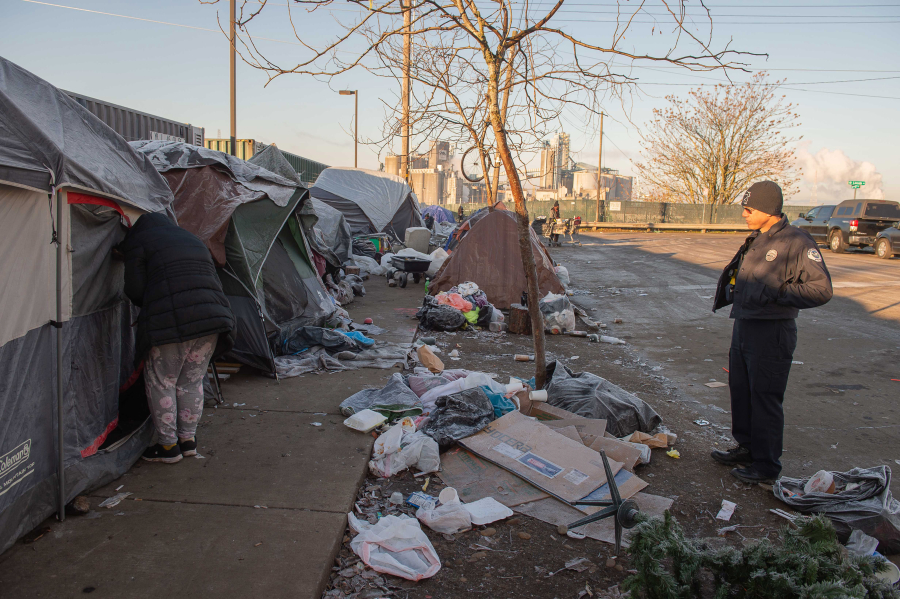The reason for law enforcement’s passivity traces back to the Washington Supreme Court’s 2021 State v. Blake decision, which ruled that drug possession was no longer a felony under state law. A few months later, the Legislature passed Engrossed Senate Bill 5476 as a stopgap, making drug possession a misdemeanor on the third offense.
This decision applies to everyone, not only those living outside. But because the homeless population is so visible to the public, drug use among the homeless has also become more visible, Chavers noted.
“Decriminalization has just made it so that they’re not afraid of any kind of criminal charge. So I literally have had people smoking in front of me,” he said. “Twenty-five years ago, that would never happen.”
In his opinion, the decision removed one of the state’s tools to help people with substance use issues. “Back when it was a felony, you actually got probation, you end up on DOSA or you go to drug court. There’s all kinds of tools that have just evaporated,” he said.
Charging people for misdemeanors, he added, isn’t a significant deterrence. “People don’t mind going and spending one night in jail, no nights in jail.”
Providing alternatives
Under Senate Bill 5476, officers are supposed to refer people to treatment on their first two drug-possession offenses. Charles Hanset with Recovery Cafe of Clark County’s Recovery Navigator Program, which formed in response to the Blake decision, previously told The Columbian that nearly all referrals he receives in urban Clark County are for people who are homeless.
Vancouver Homelessness Response Coordinator Jamie Spinelli said the treatment-based approach is “not a bad idea,” but it was “not fully baked.”
“We very rarely have treatment beds available on demand,” said Spinelli, who works with Chavers on the HART team. “I think it’s great to not criminalize something that is really an illness, but I don’t think we’ve done enough on the other end to provide for what those folks’ needs actually are.”
Sgt. Chris Skidmore with the Clark County Sheriff’s Office also thinks diversions under the Blake decision have not proven effective. When responding to drug-possession offenses, there’s little officers can do apart from handing out a list of treatment agencies, he said.
The sheriff’s office has had 84 Blake decision reports filed since May 2021, according to Skidmore. Despite the surge in fentanyl use, this number is decreasing, with just 22 reports in the last six months.
“So we go to less and less of these calls,” he said. “Even if our guys go out there, the only thing they’re going to do is hand them a sheet of paper. How much is that going to change someone’s behavior when we’re talking about the addictive qualities of fentanyl?”
Finding a happy medium
Though the Blake decision may be ineffective from law enforcement’s perspective, Council for the Homeless Executive Director Sesany Fennie-Jones thinks Washington is right to reevaluate law enforcement’s response to illegal drug use.
“I think in some cases, law enforcement can be a motivator to some people to stop using or reduce their using,” Fennie-Jones said. But there are many cases where law enforcement’s involvement makes the issue worse for people, she added.
“A person that gets a record for having possession, now let’s say they have to pay restitution,” she said. “And they need to get a job to do that. And they also need to say on their job application that they’re a felon, and people aren’t hiring them because of their felony.”
This can cause people to revert to using or selling drugs just to get by, which could land them back in jail, she said. “That’s a cycle of horrible, horrific barriers that keeps people at their lowest.”
Fennie-Jones thinks peer recovery and outreach is critical to helping people overcome addiction. “Help people where they’re at. Bringing person-centered approaches to people who really are screaming for help.”
Skidmore doesn’t know how to fix the Blake decision’s shortcomings, but in his view, something needs to change. Before Senate Bill 5476 expires on July 1, lawmakers need to decide how the state will address drug possession and addiction going forward.
“Hopefully, the Legislature takes a look at it and figures it out,” Skidmore said. “I’d love to see the ultimate answer is, ‘Let’s get these people in treatment.’ But I don’t know that doing the Blake diversions is necessarily the best route or seems to be the most effective.”
Spinelli thinks a solution could lie in community court, a model that combines community-based resources with the structure of court to address less serious crimes and misdemeanors. The model has been implemented in various communities across Washington and Oregon, including in King and Multnomah counties.
Spinelli is part of a task force that’s working to get Clark County’s community court up and running. “The whole goal there is to kind of funnel people into the services they need to address whatever their barriers are. Some of those barriers will include things like substance use,” she said. “My hope is that that’s kind of our happy medium.”




